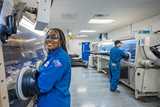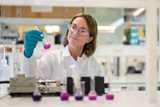Product Stewardship
Throughout the Value Chain
We understand that our important role and contribution to society and sustainability go beyond mere regulatory compliance and span all regions of our operations. We are committed to managing our products responsibly throughout the entire supply chain – from raw materials to product disposal – while consistently reducing our impact on human health and the environment.
We create business value by offering safer alternatives and more sustainable solutions through our product stewardship programs. This aligns with our goal to develop and deliver Eco-Premium Solutions to our customers and the broader market.
Our comprehensive product stewardship process consists of eight key elements and is diligently monitored at each stage. Our manufacturing sites are consistently evaluated through the Nouryon Assessment Tool.

For us, this means:
We use a global monitoring system to stay informed of regulatory developments, allowing us to advocate for and implement activities promptly. We support initiatives such as the European Green Deal, the European Union (EU) Chemical Strategy for Sustainability, and the US Toxic Substances Control Act legislation, among others. We contribute to the development of chemical management legislation worldwide through our membership in industry associations.
Our commitment to safety extends beyond our products to include our customers and all stakeholders. We provide comprehensive training on how to safely use and handle our products. Taking the Polymer Specialties business as an example, our Innovation Center, located in Deventer, the Netherlands, serves as a hub for this training as well as for innovation, where highly skilled scientists from around the globe create advanced molecules. These products are designed to address the evolving needs of the plastics and rubbers industry, prioritizing customer safety during handling and minimizing environmental impact.
A standout feature of our Deventer Innovation Center is our premier Safety Testing Laboratory. Here, we rigorously test our products and processes for safety, not only in their use but also during transportation and handling. This state-of-the-art facility, combined with our expert-led training, ensures that our employees and customers are well-equipped to handle our products safely.

Hazard Assessment and Communication
We manage many distinct substances, including raw materials used in our production and samples for research and development. Of these, 2,800 are distributed and utilized globally In 2023, 81% of our net revenue came from products containing substances that are classified as Globally Harmonized System (GHS) Categories 1 and 2 Health and Environmental Hazards.
Our expertise lies in handling intricate and hazardous chemical reactions and managing highly reactive chemicals. We ensure the safe use of all substances at our production sites and by our customers through meticulous management. Our company-wide protocol ensures that every substance manufactured by or for Nouryon has undergone a hazard assessment. This assessment is based on data related to physical chemistry, toxicity, ecotoxicity, and environmental fate.
All information needed to create labels and SDSs is stored in a centralized global database. We continually update this database with new regulatory information. The system generates labels and SDSs in accordance with each shipment's requirements, including the language and format specific to the destination country.
We are committed to avoiding vertebrate animal testing unless it is a legal requirement. We support the development of alternative testing methods that do not involve vertebrate animals and have implemented a policy to this effect. When vertebrate animal testing is mandated, we adhere to the '3Rs' principle: Replace, Reduce, and Refine animal testing.

Nouryon is dedicated to ensuring the safe use of our products in compliance with EU REACH (Regulation (EC) No 1907/2006). This regulation aims to enhance the protection of human health and the environment from potential risks associated with chemicals. REACH, which stands for Registration, Evaluation, Authorization, and Restriction of Chemicals, outlines procedures for gathering and assessing information on the properties and hazards of substances.
As part of our compliance with REACH, we conduct chemical hazard, exposure, and risk assessments, and communicate safe usage through extended safety data sheets (e-SDS). We require new suppliers within the European Economic Area to provide e-SDS documentation (along with other necessary data). Our site and procurement teams collaborate in this process, with our PSRA teams providing advice on REACH aspects and conducting regulatory checks.
Substances of concern (SoCs) are chemicals that carry severe hazard classifications and could potentially have long-term effects on human health and the environment. They typically include classifications such as CMR category 1A and 1B, PBT, and vPvB.
In 2023, products containing more than 0.1% of a substance of very high concern accounted for 2.8% of Nouryon's net revenue. As mentioned, these substances of very high concern are meticulously managed to ensure their safe manufacture and use, with all undergoing a risk assessment in line with the REACH methodology.

Nouryon does not manufacture genetically modified organisms (GMOs). We neither sell products that utilize GMOs to deliver any specific functionality, nor employ GMOs in manufacturing processes to impart variability. Certain raw materials that we use, such as soybean oil and cotton linter cellulose, are derived from crops that are produced from GMOs prior to our usage.
Innovating Sustainable Alternatives
The call for sustainable alternatives to SoCs is on the rise. Nouryon has a proven history of developing such alternatives to meet the evolving needs of our customers and regulatory requirements. In recent times, we have introduced safer substitutes such as Elfan® AT84, Redicote® E-47 NPF, and a safer alternative to Di-Cyclo HexylPhthalate (DCHP).
In the cleaning market, we have introduced innovative products such as the chelating agent, Dissolvine® GL, and wetting agent AG 6206. Berol® 260 is part of Nouryon’s low dioxane portfolio, which also includes degreasers and cleaners from the Berol® and Ethylan® surfactant product lines. These products are manufactured using a unique process that minimizes the amount of 1,4-dioxane produced as a by-product.

Examples of Product Substitution
Not only does our innovative process lower environmental impact, but it also makes the formulation process more cost-effective for our customers. It offers the potential for optimizing raw material purchases, reducing inventories, and simplifying production. All products within our low dioxane portfolio are listed in the CleanGredients database, thereby meeting the US Environmental Protection Agency Safer Choice standard. These include:
a synergistic surfactant blend that optimizes cleaning and ensures easy handling
Berol 260 is used in metal cleaners for aircraft and vehicles, as well as cleaning in industrial and home settings.
high-performance degreasers
surfactants free from nonyl-phenol ethoxylate
surfactants free from nonyl-phenol ethoxylate
performance cleaner for outside usage, qualified for direct release into the environment
a low-foam, low-aquatic-toxicity primary surfactant degreaser
wetting agent and a product for home applications such as dishwashing
Elfan® AT84 is a sulfate-free surfactant that gently cleanses skin, providing a rich creamy foam even in hard water. It is used in a wide range of personal care products.
Redicote® E-47 NPF is a safer alternative to Nonyl Phenol-ethoxylates (NPE), which have been successfully phased out in the EU.
Dissolvine® GL is used in products such as dishwasher powders, cleaning products, bath products, cosmetics, hair care, and body treatments.
A safer alternative to Di-cyclo hexyl phthalate (DCHP) was developed for our organic peroxide curing agents used in composites and coatings.
Nouryon introduced a new dispersing agent and emulsifier for industrial cleaning, hard-surface cleaning and adhesives. This ethoxylated fatty acid alcohol is a low foaming nonylphenol ethoxylate-free surfactant that has excellent wetting and dissolving properties at room temperature. It demonstrates outstanding detergency and solubility properties when formulated into multipurpose hard surface cleaners, heavy-duty degreasers, and textile treatment cleaning. The versatility of its application extends to all other cleaning applications that require alternatives to replace NP9/NP10 surfactants.
